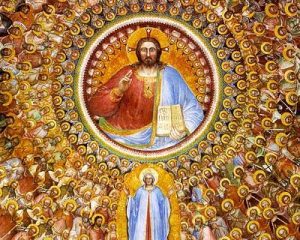On the Journey We Follow Christ
The one who we follow on our Catholic Spiritual Journey is Christ Jesus, the Way the Truth and the Life.
[fruitful_tabs type=”default” width=”100%” fit=”false”]
[fruitful_tab title=”Spirituality is Simple”]
All Christian Spirituality is Simple: Follow Christ
“As Jesus journeyed on he saw Levi the son of Alphaeus at his tax collector’s post and he said to him, ‘Follow me.’ Levi got up and became his follower.” (Mark 2:14)
 In a way, this one verse from the Gospel of Mark sums up the entire Christian journey. To each of us Jesus addresses both the invitation and the call: Come, follow me.
In a way, this one verse from the Gospel of Mark sums up the entire Christian journey. To each of us Jesus addresses both the invitation and the call: Come, follow me.
A Latin American priest, Segundo Galilea, wrote a book simply titled Following Jesus. I read Galilea’s book in the 1980’s while in seminary and was stirred by his simple yet powerful claim:
“The Gospel reveals to us the basis of all [Christian] spirituality and gives back to us the demanding simplicity of Christian identity. It teaches us that to be a disciple of Jesus is to follow him, and that this is what Christian life is. Jesus basically demanded that we follow him, and all our Christianity is built on our response to this call. Since then the essence of Christian spirituality has been the following of Christ under the guidance of the church.” (p.1; emphasis added)
[/fruitful_tab]
[fruitful_tab title=”Follow Jesus?”]
What does it mean to follow Jesus?
 To follow someone is “to follow in their footsteps,” which means to be like them. If a woman is a doctor and someone says her daughter is following in her mother’s footsteps, we know that means the daughter is going to become a doctor also.
To follow someone is “to follow in their footsteps,” which means to be like them. If a woman is a doctor and someone says her daughter is following in her mother’s footsteps, we know that means the daughter is going to become a doctor also.
To follow Christ is to be like him, to learn from him how to live, how to make the journey of life as a journey led by God’s absolute love for us (this living in the Kingdom of God, i.e. the rule of God’s love). It is also to have Jesus’ goals, teaching, and relationships in life.
Jesus says: “I am the Way, the Truth, and the Life.” (John 14:6)
The followers of Jesus are called his disciples. The word “disciple” literally means “a student” or an apprentice. We study not only the teachings of Jesus, but like an apprentice, we live with him and study him, his life, through his Scriptures, and the Teaching of the Catholic Church, and as Segundo Galilea noted “under the guidance of the church.”
[/fruitful_tab]
[fruitful_tab title=”Adventure in Christ”]
The Call to Adventure in Christ
Scholar of comparative religion, Joseph Campbell, is famous for outlining the themes of heroic journeys found in myth, legend, and everyday stories, films, and literature. The “meaningful journey” begins with a call to adventure. It is often initiated by some crisis or challenge in the person’s life. Sometimes the person who is caled called refuses the call, or at least resists it. If accepted, the heroic journey leads the person into a quest, a pilgrimage, a search to accomplish some great task. The supernatural often helps the hero and the hero shares his or her achievement for the good of others.
We may not think of ourselves as heroes, but Christ does call us to follow him who is our Hero. Most of us were initiated into Christ through Baptism (literally, immersed into his life and into his Church) either as infants or adults. At some point in our lives, either gradually or dramatically, we hear his call to follow him. It often comes as a crisis or a re-examination of our lives; perhaps we experience a great loss or we are just tired of wandering aimlessly through life. Whatever the circumstances, we are free to refuse the call and often do; but if we respond to the call of Christ, we will be called to a great gift and task: living his love with the help of his Spirit.

[/fruitful_tab]
[fruitful_tab title=”Following Jesus”]
Following Jesus in his Dying and Rising
To be a disciple-apprentice of Jesus means sharing everything with him. Central to following Jesus is to share Spiritually in his dying and rising. Baptism immerses us in the following truths:
“We were indeed buried with him through baptism into death, so that, just as Christ was raised from the dead by the glory of the Father, we too might live in newness of life. For if we have grown into union with him through a death like his, we shall also be united with him in the resurrection.” (Romans 6:4,5)
This dying and rising is the pattern of our discipleship in Christ. There are many “dyings” before our physical death and many “risings” before our physical resurrection after death. By the power of the Holy Spirit, we are constantly called to die to (put to death in us) sin and selfishness. This is so we can rise above our ego and have the newness of life in Christ. We can only do this effectively with the help of Christ, by his grace.
“The Christian life is a constant dying to what is less in order to live what is more…[it is] dying to anything that diminishes our response to Jesus Christ on earth so that we might begin to experience the fullness of life here and now.” (Fr. David Knight, Reaching Jesus: Steps to a Fuller Life, p.5)
This pattern of dying and rising in Christ is called in our Tradition the Christian Passover Mystery (or Paschal Mystery). This refers to passing over from death to new life in Christ, passing from the slavery of sin into the freedom of a life of life-changing love in Christ.So, all along the Catholic Spiritual Journey, we are making this Passover Journey with Christ.
The challenge to die to what is less so as to rise to what is more will involve us in a heroic life all during our journey. It will plunge us into the deepest places of the soul with Christ, and make us compassionate as we share the struggles of others in this life.
[/fruitful_tab]
[fruitful_tab title=”The Whole Christ”]
Following the Whole Christ
 Another Scriptural insight about the Risen Christ is that he is united to his followers in such an intimate and spiritual union, that they are his Mystical Body, the Church. The New Testament mentions this mystery several times.
Another Scriptural insight about the Risen Christ is that he is united to his followers in such an intimate and spiritual union, that they are his Mystical Body, the Church. The New Testament mentions this mystery several times.
The implication of this teaching and reality is that we cannot have Christ without his Body the Church. The Catholic Tradition even talks about “the Whole or Total Christ,” meaning Christ and his Body the Church. The Church speaks for Christ when she proclaims his Gospel, teaches his life, and celebrates his worship in union with him.
The emphasis on the necessity of belong to the Church in following the Whole Christ is very Catholic. Catholics believe that the Roman Catholic Church has followed Christ for almost 2000 years now. The journey has been long and we have many companions on this journey, both in our parish and with fellow Catholics and other Christians, but also with all who have journeyed before us in the past, especially the saints.
“Being Christian means setting out on an inner journey, a journey of following Jesus. Along the way we learn to obey and imitate him. Above all we become intimate friends, and our lives are transformed by that friendship. Jesus calls us to turn to him in all life’s experiences, to develop spiritual eyes acutely attuned to signs of his presence. Gradually, we realize that Jesus has nothing less in view than a radically new creation of our very selves.” (Mark Harris, Companions for Your Spiritual Journey: Discovering the Disciplines of the Saints, emphasis added)
[/fruitful_tab]
[fruitful_tab title=”Kingdom of God”]
Conversion for the Sake of the Kingdom of God
To follow Christ demands a conversion on our part. After Jesus is baptized in the Jordan River, his message is “Repent, for the Kingdom of God is near!” (Matthew 4:17)
We must understand what Jesus experienced at his Baptism: the heavens opened, the Holy Spirit came upon him, and the voice of God the Father was heard saying: “This is my Beloved Son with whom I am well-pleased.” (Matthew 3:17)
Jesus found his life and his identity in the love of God his Father. He is the Beloved One, with the loving Spirit Helper at his side. Jesus thus brings the Kingdom of God to us because that Kingdom is the rule of God’s love. A kingdom speaks of a ruler and a rule; and God is love (1 John 4:8b) So, the Kingdom of God is the rule of God’s love. This love totally rules in Jesus’ life and he initiates us, also, into this abundant and life-giving love.
When we are baptized (immersed) into the life of Christ Jesus and his Body, the Church, we also are given the identity of beloved sons and daughters of God. “The love of God is poured out in our hearts by the Holy Spirit given to us.” (Romans 5:5) And we are to live a life liberated from sin. “We believe in one Baptism for the forgiveness of sins.” (The Creed)
Sin is the refusal to love with God’s love. (Catechism#1850: “Sin sets itself against God’s love for us and turns our hearts away from it”) If love is our existence and identity in Christ, the Beloved, then we can see why we must repent of sin and turn away from it, for the Kingdom of God is near to us, it is within us.
Jesus is continually saying to us; “Follow me.” Let us turn our lives over to him continually, asking for him to rule in our hearts as we make this journey of life with him.

[/fruitful_tab]
[/fruitful_tabs]
